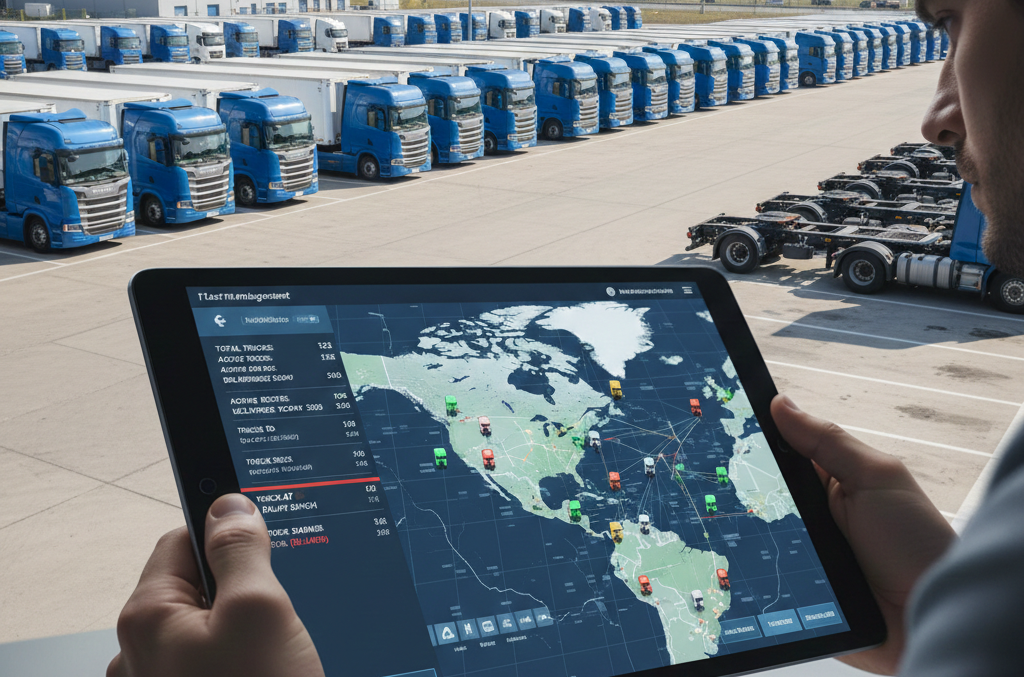Why Efficient Fleet Tracking is Crucial for Logistics Success?
-
April 7, 2025
-
7 min read

Efficient fleet tracking is essential for logistics success for higher operational efficiency. In India, sectors like logistics, manufacturing, and healthcare rely on advanced tracking solutions to overcome challenges such as theft, limited visibility, and high tracking costs.
The Airtel IoT SuperTracker offers an innovative approach by leveraging GSM-based tracking, which provides cost-effective monitoring with extended battery life. While not real-time like GPS, it ensures reliable tracking, particularly for logistics companies dependent on third-party fleet operators.
This dependency often leads to visibility gaps, billing discrepancies, and operational inefficiencies. A smart tracking solution bridges these gaps, making fleet management more affordable and efficient.
For any logistics business aiming to thrive in this competitive environment, embracing this technology is not just an option—it’s a necessity. Let’s get insights into how this tool can transform your logistics operations.
10 Essential Benefits of Efficient Fleet Tracking for Logistics Success
Efficient fleet tracking is indispensable in modern logistics, and offers crucial enhancements in operational efficiency, safety, transparency, and customer service. Here’s a look at each benefit:
1. Optimised Route Management
Efficient fleet tracking is vital for optimising routes, which significantly reduces travel times and fuel costs. Logistic companies can ensure the most efficient paths are taken for deliveries. This not only conserves resources but also improves overall service delivery speeds, contributing to greater customer satisfaction and lower operational expenses.
- Fuel Efficiency: Optimal routing conserves fuel to reduce environmental impact and save costs.
- Scheduled Maintenance: Alerts for maintenance help avoid costly breakdowns, and keep the fleet in good working condition.
- Improved Driver Behavior: Tracking driver behavior promotes safer and more efficient driving habits.
- Customer Satisfaction: Ensures deliveries are timely, which enhances customer trust and business reputation.
Note: Using IoT SuperTracker does not offer real-time tracking but location updates range from a minimum of 2 minutes to a maximum of 24 hours. This feature supports optimised route management, crucial for efficient fleet tracking that reduces travel times and fuel costs.
2. High Safety Measures
Safety enhancements through efficient fleet tracking are crucial for protecting assets and reducing the risk of accidents.
- Driver Performance: Analyses driving patterns to enforce safe driving practices.
- Compliance with Regulations: Makes sure all operations adhere to transportation and safety laws.
- Vehicle Upkeep: Maintains fleet condition through timely updates on vehicle health.
- Emergency Response: Helps with faster and more effective response in case of accidents.
3. Cost Reduction
Adopting efficient fleet tracking significantly lowers overall operational costs by enhancing fuel efficiency, reducing idle times, and preventing theft. This technology enables businesses to precisely monitor and optimise their fleet operations, leading to substantial cost savings across various facets of logistics from fuel consumption to maintenance and insurance premiums.
- Minimised Idle Times: Actively monitors and reduces vehicle idle times to save fuel.
- Theft Prevention: Enhances security with real-time location tracking, deterring theft and aiding quick recovery.
- Insurance Premiums: Better safety and theft prevention can result in lower insurance costs.
- Operational Efficiency: Simplifies fleet management, leading to reduced administrative and operational overhead.
- Asset Utilisation: Assures all vehicles are used efficiently, maximising investment returns.
4. Transparency
Efficient fleet tracking offers unparalleled transparency into the operations of a logistics company, and enhances partnerships with clients.
- Documentation Accuracy: Guarantees all transport records are accurate and accessible.
- Performance Analysis: Data collected helps identify areas for operational improvement.
- Accountability: Assigns clear responsibility for actions and events within the fleet operations.
- Enhanced Communication: Improves overall communication between dispatchers, drivers, and customers.
5. Better Customer Service
Utilising efficient fleet tracking transforms customer service by providing more accurate delivery predictions and enhancing the adaptability of service responses. This reliability in scheduling and ability to adjust quickly to changing conditions leads to higher customer satisfaction, and encouraging repeat business.
- Delivery Predictability: Tight control over delivery schedules increases reliability.
- Flexibility in Operations: Enables swift adjustments in response to customer needs.
- Proactive Service: Issues are managed before impacting the customer.
- Enhanced Reliability: Consistent service delivery builds customer trust and business credibility.
- Feedback Loop: Direct input from customers can be used to refine services.
6. Environmental Responsibility
Efficient fleet tracking aids in fulfilling environmental responsibilities by optimising routes and reducing unnecessary fuel consumption. This strategic approach not only lessens the ecological footprint of logistics operations but also aligns with global sustainability goals, showcasing a commitment to environmentally friendly business practices.
- Reduced Carbon Footprint: Efficient routing leads to lower emissions.
- Eco-Driving Techniques: Promotes driving habits that minimise fuel use and emissions.
- Vehicle Upgrades: Provides data to support investment in greener vehicles.
- Resource Optimisation: Full utilisation of each vehicle, and reduce overall environmental impact.
- Regulatory Compliance: Helps meet environmental standards and reporting requirements.
7. Scalability of Operations
The scalability provided by efficient fleet tracking allows logistics operations to expand seamlessly with growing business demands. Here is how efficient fleet tracking helps with regards to scalability of operations.
- Adaptable Infrastructure: Expands tracking capabilities as business needs grow.
- Modular Upgrades: Easily integrates additional features to enhance data collection and analysis.
- Data-Driven Decisions: Utilises extensive data logs to guide business expansion strategies.
- Integration with Other Systems: Smooth IoT connectivity with existing business management tools.
- Future-Proofing: Prepares the business for future technological and market changes.
8. Improved Asset Management
Effective asset management is achieved through efficient fleet tracking, which provides detailed insights into the usage and status of each vehicle. This information helps in optimising asset use, planning maintenance, and boosting the overall lifecycle management of the fleet.
- Lifecycle Tracking: Monitors the usage and performance of vehicles over their operational lifespan.
- Inventory Management: Keeps accurate tabs on vehicle availability and condition.
- Cost Management: Tracks and predicts costs related to fleet operations.
- Utilisation Rates: Optimal use of each vehicle to avoid underutilisation.
- Recovery of Assets: Aids in the quick recovery and reallocation of assets as needed.
9. Data-Driven Insights
Efficient fleet tracking generates valuable insights from data, enabling logistics companies to make informed decisions that enhance operational efficiency and strategic planning. This analysis supports better resource management, improved service offerings, and proactive business adjustments.
- Performance Benchmarks: Establishes and tracks performance against industry standards.
- Predictive Analytics: Uses past data to predict future trends and requirements.
- Risk Management: Identifies and mitigates potential risks in real-time.
- Custom Reports: Tailors reports to specific business needs for deeper insight.
- Market Trends: Analyses fleet data to understand market demands and operational challenges.
10. Regulatory Compliance
Efficient fleet tracking guarantees compliance with regulatory requirements, reducing the risk of legal issues and enhancing operational legitimacy. This technology helps logistics companies adhere to industry standards and legal mandates.
- Documentation Control: Automates record-keeping, ensuring compliance with laws.
- Audit Trails: Provides comprehensive logs for audits and inspections.
- Safety Standards: Enforces safety protocols across the fleet.
- Legal Compliance: Updates operations in accordance with evolving laws and regulations.
- Driver Regulations: Monitors and enforces driver compliance with work hour regulations.
Integrating Airtel IoT SuperTracker for Logistics Success
In this competitive logistics industry, efficient fleet tracking is fundamental for success. The Airtel IoT Super Tracker enhances this efficiency by offering top-quality features that support real-time vehicle tracking, route optimisation, and preventive maintenance. Its IoT-based capabilities make sure that logistics operations can maintain high levels of reliability and compliance with safety standards.
Adopting the IoT SuperTracker can help logistics companies stay ahead by effectively managing their fleet operations, reducing costs, and improving service delivery.
Final Thoughts: The Critical Role of Efficient Fleet Tracking in Logistics
In the logistics sector, the integration of technologies like the Airtel IoT SuperTracker is not merely beneficial—it’s essential for staying competitive. By employing efficient fleet tracking, companies can drastically improve their operational efficiency, safety, transparency, and customer service.
The Airtel IoT SuperTracker enables businesses to leverage data for better decision-making, smoother operations and superior service delivery. Embracing such advancements in technology can significantly enhance a logistics company’s ability to meet modern demands and scale effectively.
 Share
Share









